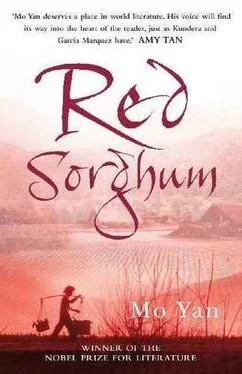‘Fuck your old lady, Pocky Leng!’ Granddad growled. ‘Feast your eyes on the Zhaos you rescued! All the villagers are right here.’
He pointed to the blind and crippled men on the wall.
The pale marks on Pocky Leng’s face reddened. ‘Yesterday afternoon my troops fought at Pingdu till they were bathed in blood, suffering enormous losses. My conscience is clear.’
‘Since you and your esteemed troops knew the enemy had surrounded the village, why didn’t you come to the rescue?’ Jiang asked. ‘Why pass up a fight in your own backyard, and travel a hundred li just to harass the town of Pingdu? These aren’t motorcycles your esteemed troops are riding, you know. And even if you were so anxious for some action you had to go off to harass Pingdu, the enemy troops you routed should still be in retreat. But you, Commander, look fit and relaxed, not a speck of dirt on you. I wonder how you set about commanding this great battle.’
Leng turned red all the way to the roots of his ears. ‘I’m not going to argue with you, Jiang! I know why you’re here, and you know why I’m here.’
‘Detachment Leader Leng,’ Jiang said, ‘as I see it, you went about yesterday’s battle at Pingdu all wrong. Now, if I’d been in command of your esteemed unit, instead of coming to break the encirclement of the village I’d have spread the men out in an ambush in the cemetery, using the gravestones as cover. Then I’d have set up the eight machine guns you captured after the ambush at the Black Water River and fired on the Japs when they came down the road. Since they and their horses would be exhausted after fighting all day, and low on ammo in unfamiliar surroundings in the dark, they’d be sitting ducks. They couldn’t possibly get away. That way you’d have performed a great service for the people and made heroes of your soldiers. Your glory would have been added to that of the ambush at the Black Water River, and you’d have a brilliant reputation! What a shame, Detachment Leader Leng, that you missed your chance. Instead of making heroes of your soldiers and serving the people, here you are, trying to gain some little advantage from orphans and widows. Although I’m normally immune to shame, what you have done shames me!’
All the red-faced Leng could do was stammer: ‘Jiang… look down on me…. Wait till I fight a major battle, then you’ll see….’
‘When that day comes, we’ll stand shoulder to shoulder with you!’
‘I don’t need your help! I can fight my own battles!’
‘You have my undying admiration!’ Jiang said.
Detachment Leader Leng mounted his bicycle and was about to ride off when Granddad stepped up and grabbed the front of his shirt. ‘When this war with Japan is over, Leng,’ he said with murder in his eyes, ‘you and I have some unfinished business!’
‘You don’t scare me!’ Leng snarled.
Pushing down hard on his pedal, he rode off, followed by his two dozen troops, like a pack of dogs chasing a rabbit.
‘Commander Yu,’ Jiang said, ‘the Jiao-Gao regiment will always be your devoted ally.’
He thrust his hand out to Granddad, who reached out awkwardly and shook it. Tough though it was, Granddad could also feel its warmth.
THE TIME: FORTY-SIX years later. The place: the spot where Granddad, Father, and Mother had fought a heroic battle against a pack of dogs led by the three from our family — Blackie, Red, and Green. On one stormy night lightning split open a mass grave where Communists, Nationalists, commoners, Japanese, and puppet troops were buried — a site called All-Souls Grave — spreading rotting bones over a ten-yard area, where they were washed clean by the rain and turned a sombre white. I was home on summer holiday at the time, and when I heard that All-Souls Grave had opened up I rushed over to see for myself, our blue-coated little dog following hard on my heels. It was still drizzling, and the dog darted in front of me, his paws splashing loudly in the muddy puddles. It wasn’t long before we were in the midst of bones that had been sent flying with explosive force, and Blue ran up to sniff them, quickly shaking his head to show that they didn’t interest him.
People stood fearfully around the exposed graveyard. I squeezed in among them until I could see the skeletons at the bottom of the pit, piles of bones exposed to the sun for the first time in all those years. I doubt that even the provincial party secretary could have told which of them belonged to Communists, which to Nationalists, which to Japanese soldiers, which to puppet soldiers, and which to civilians. The skulls all had the exact same shape, and all had been thrown into the same heap. The scattered raindrops beat a desolate rhythm on the white bones, forceful and fiendish. Skeletons lay on their backs, nearly submerged in the icy water, like fermenting sorghum wine that had been stored up for years.
The villagers picked up the bones that had been scattered around the area and tossed them back in. A momentary dizziness came over me, and when it passed I took another look, discovering the skulls of dozens of dogs mixed in with the human heads in the grave. The bottom of the pit was a shallow blur of white, a sort of code revealing that the history of dogs and the history of men are intertwined. I helped pick up the scattered bones, but put on a pair of white gloves just to be on the safe side. Noticing the hateful stares of the villagers, I quickly took them off and stuffed them into my pants pockets, then walked down the bone-strewn road all the way to the edge of the sorghum field, a good hundred yards away.
There in the short green grass, still dripping with water, lay the curved dome of a human skull. The flat, broad forehead showed that it hadn’t belonged to any ordinary person. I picked it up with three fingers and had started running back with it when I spotted another muted gleam of white in the grass not far away. This one was a long, narrow skull with several sharp teeth still in its opened mouth; I knew it was one I didn’t have to pick up, for it belonged to the same species as the little blue-coated friend tagging along behind me. Maybe it had been a wolf. All I knew for sure was that it had been blown over here by the explosive force, for the specks of dirt on its freshly cleaned surface proved it had lain in the mass grave for decades. I picked it up anyway. The villagers were tossing bones stolidly into the grave, some cracking and splitting when they hit. I tossed in the fragment of the human skull. But when it came to the large canine skull I hesitated. ‘Toss it in,’ an old man said; ‘the dogs back then were as good as humans.’ So I tossed it into the open pit. Once All-Souls Grave had been filled in, it looked just as it had before the lightning hit. In order to calm the frightened souls of the dead, Mother burned a stack of yellow spirit money at the head of the grave.
After helping fill in the pit, I stayed with her to look down at this resting place of a thousand bodies, and kowtowed three times.
‘It’s been forty-six years,’ Mother said. ‘I was fifteen then.’
I WAS FIFTEEN then. When the Japanese surrounded the village, your maternal grandfather and grandmother lowered me and your young uncle into a dry well. We never saw them again. Later on I learned they were killed that very morning.
I don’t know how many days I hunkered down inside that well. Your uncle died there, and his body began to stink. The toad and yellow-banded snake stared at me until I nearly died of fright. I was sure I’d die down in that well. But finally your father and your granddad came along.
Granddad wrapped the fifteen ‘38’ rifles in oil paper and tied them with rope, then carried them to the edge of the well. ‘Douguan, look around and make sure nobody can see us.’
Читать дальше












